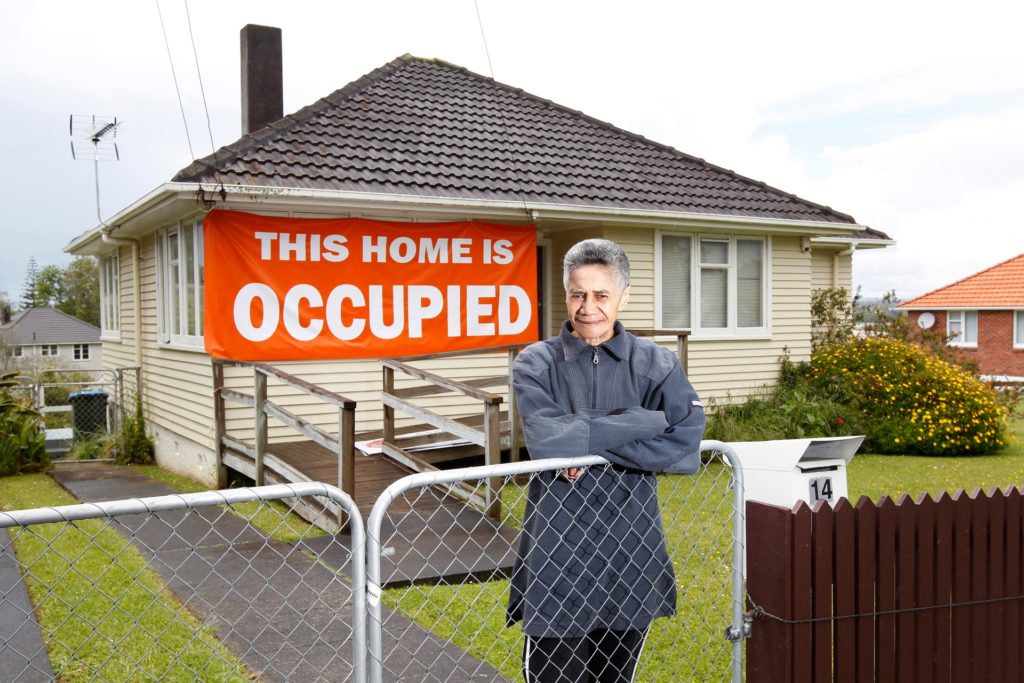Ioela Niki Rauti is standing firm in the face of property developers.
Late 2014 Niki Rauti was served a 90 day eviction notice to vacate the Housing New Zealand state home she has lived in for over twenty years. With support from the local community, young activists and the Tamaki Housing group, she has fought attempts at eviction and won. The saga of Niki’s fight has been on-going for six years and she is now facing another eviction after the expiration of a new 90 day eviction notice served November 2016. With the possession order being granted by an adjudicator on Friday 24th February, Niki and her supporters have been kept on their toes, but have had some reprieve in a stay of proceedings being granted putting the eviction temporarily on hold.
Residents of Glen Innes along with members of the public and various organisations marched in numbers to Nikis’ residence at 14 Taniwha Street on the 17th January in solidarity and to begin mass occupation of the property. Roughly 300 people descended upon Niki’s property in two separate marches, one comprised solely of locals and the other of interested parties. Since then, the occupation has been intermittent.
This home is occupied! reads the banner outside Niki’s home.
Residents of Glen Innes were first introduced with the prospect of evictions when, in 2011, 156 residents were served with eviction notices with no right to return to the community they live in. Glen Innes residents, primarily inhabited by Māori and Pacific peoples, have seen the median home value in their area skyrocket to $967,000 (QV). HNZC have stated that the project “will mean a reduction in the number of state houses in the project area”.
The process of gentrification in Glen Innes has been sold as a community-led project to revitalise Glen Innes as a contemporary suburb of the Auckland Supercity, boasting a mixture of social, affordable and private housing. The rationale of the redevelopment project appeals to the neo-liberal ideals of ethnic and class diversity, providing a ‘shot in the arm’ to the economic and social life of the Glen Innes community, by introducing professional and middle class tenants into the housing market. The grim reality of the situation is the displacement of the community’s most vulnerable members from their bases of support and their homes in the pursuit of profit.
The Tamaki housing group has stood up to this misappropriation of what constitutes a community. The agenda of the property developers involved is in capital expansion. The use of the language of ‘community’ by property developers and supposed experts on urban development is an empty gesture of anonymity justifying the dispossession of those who call Glen Innes home of their self-determination and their livelihoods.
Since media attention began to pick up on Niki’s case, TRC (Tamaki Redevelopment Corporation) have jumped to offer Niki a choice of several new homes in Glen Innes. Niki has chosen to reject every offer presented to her to highlight the injustices the whole community and everyone facing eviction and precarious living situations are being subject to.
Through Niki’s fight, people have been able to air their experiences and look deeper into the goings on of the council/crown partnership in TRC. Questions have been brought up surrounding the ownership and sale of the properties being sold off to developers. With no meeting minutes, no cost benefit analysis and no information being made public about the sales process of approx. 2800 properties valued upwards of 2 billion dollars, there are many unanswered questions.
The transfer of all HNZs Tamaki properties to the Tamaki Transformation project, the largest community transformation project in Australasia, run by TRC, is the flagship for how the government plans to abolish state homes. In reality this involves isn’t regenerating Tamaki but rather removing the families from the state houses in North Glen Innes for a new “clean slate”. These houses are then demolished or removed from the site in order to make way for private development. This is following the National Party’s ideologically driven agenda of Neoliberalism selling off all state-owned assets in favour of laissez fare economics. In the words of Michael Hudson “Socialising the debt and privatising the profits”.
This is all part of the gentrification process we have seen develop in the New Zealand in the past 4 decades. Māori and Pacific people are displaced from their local communities to make way for profit, as has happened in Ponsonby in the 80s and Mt Eden more recently. With tenants from Glen Innes being shifted as far as Mangere and Manukau with no promise of even being housed in Tamaki (HNZC), we see the government’s true contempt for state housing tenants.
As we have seen the number of inner city homeless grow, doubling since 2013, now is the time to be building, not selling, state homes. With National seeking to abolish State housing and Labour promising as little as 1000 new state homes annually and cutting out plans for a capital gains tax in their bid for election this year, we can see that neither of the mainstream parties are concerned with the interests of the working class, rather they are content to support rampant profiteering at the cost of people’s homes.
We stand with Niki in her fight to not be moved and for the rights of every person to a roof over their head.









